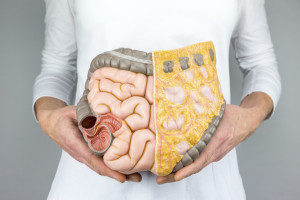
Is modern civilization making us sick?
That’s one theory to explain why more people have Crohn’s disease today than 50 or 100 years ago.
Crohn’s, a type of inflammatory bowel disease, is a long-term chronic illness that may come and go throughout your life, according to Randall Meisner, MD, a gastroenterologist with the Spectrum Health Medical Group.
It packs a triple whammy of redness, inflammation and sores along the digestive tract.
Symptoms may be mild or severe and include diarrhea, fatigue, fever, abdominal pain, blood in the stool, mouth sores, a poor appetite and weight loss.
According to Dr. Meisner, Crohn’s was on the increase for about 50 years, but it has started to level off now.
“Crohn’s is more common in North America and Europe and less common in underdeveloped countries,” Dr. Meisner said. “That raises the question about whether there are environmental factors involved like a more processed diet, higher rates of vaccination and an increase in allergies.”
Despite about 700,000 people in the United States living with Crohn’s, there’s no cure and there’s no special diet that works, although it helps some patients to avoid milk, alcohol, hot spices or fiber.
Treatment approaches include nutritional supplements and a variety of medications including some new, recently approved therapies. Others are on the horizon.
Approximately 7 of 10 Crohn’s patient will need surgery to remove the diseased part of their intestine, but it’s not a cure-all: Inflammation often returns elsewhere, leading to a vicious cycle of symptoms and surgery.
Wondering if you could have Crohn’s? It’s most common in people age 15-35, but anyone can get it.
Men and women are equally at risk—and your risk goes up if a close relative has Crohn’s disease. The risk is also higher for whites and for Jews of European descent. Living in a developed country, a city, or a northern climate is also a strike against you.
“It’s possible that people living in a society with exposure to more bacteria are somehow protected,” Dr. Meisner said.
That theory has led to some interesting experiments. But, ultimately, it has been found there’s really nothing you can do to prevent Crohn’s. At least, not yet.
“You can get a genetic blood test to check your predisposition, but I don’t usually recommend it because the tests aren’t that reliable,” Dr. Meisner said.
 /a>
/a>
 /a>
/a>
 /a>
/a>